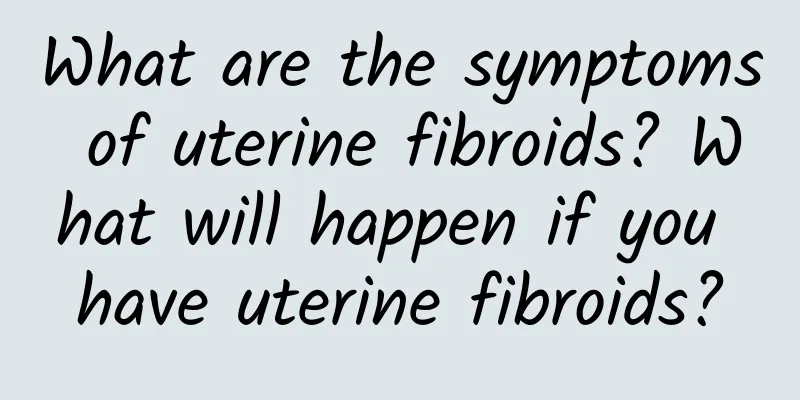What are the symptoms of uterine fibroids? What will happen if you have uterine fibroids?

|
What are the symptoms of uterine fibroids? This is a question that many women often ask when they face the problem of uterine fibroids. Uterine fibroids are muscle tumors that grow on the inner wall of the uterus. It is a common gynecological disease that many women may suffer from. So, what are the symptoms of uterine fibroids? Next, I will introduce it to you in detail. 1. Common symptoms of uterine fibroids 1. Abnormal menstruation: Women with uterine fibroids may experience irregular menstruation, such as prolonged menstruation, menorrhagia, and unstable menstrual cycles. Some women may even have their menstrual period extended to more than 7 days. 2. Abnormal menstrual blood: Uterine fibroids may cause menstrual blood to become darker in color, thicker in texture, and even accompanied by lumps, which is a problem for women's life and psychology. 3. Abdominal pain and bloating: Due to the presence of fibroids in the uterus, they may compress nearby tissues and organs, causing abdominal pain and bloating. 4. Difficulty urinating: The growth of fibroids may compress the bladder, causing problems such as difficulty urinating or frequent urination. 5. Pain during sexual intercourse: Uterine fibroids may affect the quality of sexual life, cause pain during sexual intercourse, and bring discomfort and stress to women. 2. Progression and complications of uterine fibroids 1. Fibroid growth: Uterine fibroids may gradually grow larger over time and even cause the uterus to swell, which can put an extra burden on women physically and mentally. 2. Infertility: The presence of fibroids may affect the endometrium and ovarian function, making it difficult for women to conceive or increasing the risk of miscarriage. 3. Pregnancy complications: During pregnancy, uterine fibroids may lead to a higher miscarriage rate, and may also cause complications such as abnormal placenta implantation and abnormal fetal position. 3. How to deal with uterine fibroids 1. Regular check-ups: Women should undergo regular prenatal and gynecological examinations to detect and treat uterine fibroids in a timely manner. 2. Drug treatment: For early-stage uterine fibroids, doctors may choose drug treatment, such as Chinese medicine, Western medicine, etc., to relieve symptoms. 3. Surgical treatment: For larger or more severe symptom-prone uterine fibroids, surgery is a common treatment method, such as myomectomy or hysterectomy, to completely solve the problem. In the middle of the article, we will list some common symptoms of uterine fibroids and present them with serial numbers. This will introduce readers to the relevant knowledge of uterine fibroids more clearly. Through this article, we hope to help everyone gain a deeper understanding of uterine fibroids, detect and treat the disease in a timely manner, and protect women's health. |
Recommend
Are endometritis and pelvic inflammatory disease treated with the same medication?
There may be some overlap in the medications used...
What tests are needed for pelvic peritonitis?
Examination is very important for patients. If th...
I gain 3 pounds every Chinese New Year! 4 tips for losing weight during the Spring Festival to enjoy slim happiness
I gain 3 pounds every Chinese New Year! The Sprin...
Beware of the cause of moderate cervical erosion due to excessive cleaning
At present, the cause of moderate cervical erosio...
Don’t miss: What are the early symptoms of ectopic pregnancy in women?
What are the early symptoms of ectopic pregnancy?...
Can ectopic pregnancy be detected with test strips?
Can ectopic pregnancy be detected using test stri...
Can I drink saffron tea for irregular menstruation?
You can drink saffron in water in moderation when...
Why do you need a gynecological examination before abortion?
Artificial abortion, also known as artificial abo...
How to treat uterine fibroids? What should not be eaten during the treatment of uterine fibroids?
What should not be eaten during the treatment of ...
Squats or jogging, which one hurts your knees more?
Squats are also known as the king of exercise. Th...
Is soy milk more nutritious than milk? Chinese medicine doctor reveals 6 magical effects of soy milk, "these people" should not drink it
Do you like to drink soy milk for breakfast? Or d...
Balcony farmers' most "homely" dwarf rice
Want to experience the fun of growing rice on you...
How to regulate irregular menstruation? Pay attention to the six complications of irregular menstruation
Irregular menstruation is definitely not a trivia...
What is the difference between pelvic inflammatory disease and gynecological inflammation?
The main difference between pelvic inflammatory d...
Moxibustion treatment of cervical erosion
Generally speaking, cervical erosion will not hea...









